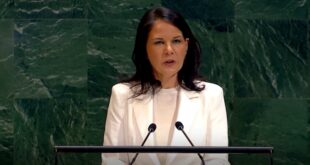Clashes have resumed in South Sudan’s capital Juba between troops loyal to President Salva Kiir and ex-rebel leader Riek Machar. Former UN diplomat Peter Schumann tells DW the fighting may escalate into a full-scale war.
South Sudan’s presidency on Friday put the death toll from the clashes at 270, although it is thought to be much higher by now. The country’s embattled president called for calm in a bid to end the bloodshed on Sunday. Witnesses reported Monday hearing gunfire near military barracks hosting ex-rebel leader Riek Machar and his troops in Juba’s suburbs of Gudele and Jebel.
United Nations Secretary General Ban Ki-moon said he was “shocked and appalled” by the fighting and called on both sides to stop the violence. The renewed clashes have raised fears that South Sudan could face more instability after emerging from a two-year civil war, which began in December 2013.
The world’s youngest nation has seen more fighting than peace since winning independence from Sudan in July 2011. Peter Schumann, former director of the United Nations mission to Sudan, told DW that there is a strong possibility that this renewed fighting may escalate into a full-scale war.
DW: What do you think triggered the fighting between forces loyal to President Salva Kiir and those of Riek Machar?
Peter Schumann: There are reports that forces from outside Juba are advancing towards the capital. We had a similar thing in December 2013. Civilians are targeted because they are part of a particular ethnic group [which is] aligned to political groups – either Riek Marchar’s opposition or the government.
The similarities are scary because we now know what happened after December 2013. Will it escalate again? My understanding, from what I see and what I hear from Juba, is that the probability of it escalating into a full-scale war is much higher than that [of the situation] stabilizing.
DW: Each side claims to have been attacked by the other and no one has taken responsibility so far. Does this mean that the two leaders, Kiir and Machar, need a third party?
We have seen over the last two years that a third party engagement has a very limited possibility of stopping the fighting. I think very importantly, the inability of Salvar Kiir, Riek Machar and the second vice-president James Wani Igga, who [failed] to give clear orders and stop the fighting, leaves only one conclusion – that they are not in charge of those who are really fighting.
DW: What do you think could be done to bring the country back to normality?
I think it needs a very radical approach. Neither Riek Machar nor Salva Kiir have demonstrated that they can bring stability back to the country. Both of them have to leave the arena. We need a fresh leadership, we need a completely new setup in South Sudan.
This interview was conducted by Eunice Wanjiru.
www.dw.com
 THE AFRICAN COURIER. Reporting Africa and its Diaspora! The African Courier is an international magazine published in Germany to report on Africa and the Diaspora African experience. The first issue of the bimonthly magazine appeared on the newsstands on 15 February 1998. The African Courier is a communication forum for European-African political, economic and cultural exchanges, and a voice for Africa in Europe.
THE AFRICAN COURIER. Reporting Africa and its Diaspora! The African Courier is an international magazine published in Germany to report on Africa and the Diaspora African experience. The first issue of the bimonthly magazine appeared on the newsstands on 15 February 1998. The African Courier is a communication forum for European-African political, economic and cultural exchanges, and a voice for Africa in Europe.




















